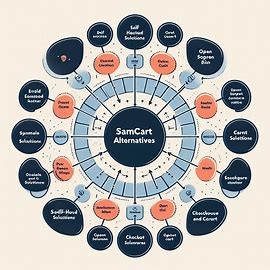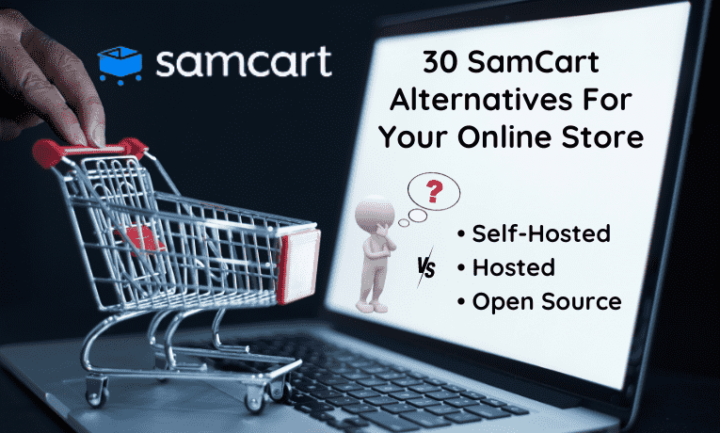The online shopping industry is rapidly expanding as more individuals utilize e-commerce platforms.
If you want to start your store or switch from one platform to another, you must do intensive research into the providers available—especially those considered competitors to SamCart.
When assessing potential competitors, it is essential to compare different types of eCommerce platforms.
Consider both hosted and self-hosted solutions before deciding for yourself or your business.
In this post, we have compiled a list of 30 SamCart alternatives based on various categories of eCommerce platforms available today.
Self-Hosted Alternatives to SamCart

Self-hosted refers to software or applications that you install and run on your server or hosting environment rather than using a service provided by a third party.
It means you have complete control over the software, including customization, security, and data management.
Key Characteristics of Self-Hosted Solutions
- Control: You manage the software, including updates and configurations, allowing for greater customization.
- Cost: Typically, self-hosted solutions don’t involve ongoing subscription fees, though you may incur hosting costs and need to manage server maintenance.
- Flexibility: You can modify the software to suit your specific needs, adding plugins or features as necessary.
- Data Ownership: You retain full ownership of your data, which can be important for privacy and compliance.
- Technical Requirements: Self-hosted solutions often require a certain level of technical knowledge to set up and maintain.
Common examples of self-hosted eCommerce platforms include
- WooCommerce: An open-source eCommerce platform that integrates seamlessly with WordPress, offering extensive customization options.
- Magento: A flexible and powerful open-source platform designed for larger businesses, allowing complete customization and scalability.
- ShopCart App: An open-source, self-hosted application that integrates seamlessly into Joomla and Drupal websites.
- OpenCart: A user-friendly eCommerce solution with a straightforward installation process and numerous functional modules.
- osCommerce: A popular choice among small business owners, offering a strong community support system.
- ZenCart: An open-source eCommerce solution focusing on user-friendliness and customization.
Pricing Comparison for Self-Hosted Solutions
| Self-Hosted Solution | Starting Price | Trial/Free Account |
|---|---|---|
| WooCommerce | Free | Free |
| Magento | Free | Free |
| ShopCart App | Free | Free |
| OpenCart | Free | Free |
| osCommerce | Free | Free |
| Zen-Cart | Free | Free |
Hosted Solutions to SamCart with Most Features & Integrations
Hosted solutions refer to software or applications that are provided and maintained by a third-party service provider.
Users access these platforms via the internet, and the hosting provider takes care of the infrastructure, security, and updates.
Key Characteristics of Hosted Solution
- Ease of Use: These platforms are typically user-friendly, with simplified setup processes and intuitive interfaces.
- Maintenance-Free: The service provider handles all technical maintenance, including server management, updates, and security.
- Subscription-Based: Hosted solutions often operate on a subscription model, meaning users pay a monthly or annual fee.
- Scalability: Many hosted platforms can easily scale with your business needs, accommodating increased traffic or additional features.
- Support: Users typically have access to customer support from the provider.
Common examples of hosted solutions include
- ClickFunnels: An all-in-one platform focused on building high-converting sales funnels and optimizing the checkout process.
- ClickFunnels 2.0: The upgraded version featuring enhanced funnel-building and customer journey optimization.
- ThriveCart: Optimizes checkout processes and increases conversions.
- PayKickstart: Focuses on recurring billing and optimizing checkout flows, ideal for subscription-based products.
- E-junkie: An affordable platform for selling digital products with no transaction fees.
- Gumroad: An easy-to-use platform for selling digital content—from eBooks to software.
- SendOwl: Focused on selling digital products with a flexible pricing model and unlimited products, subscriptions, and integrations.
- Ecwid: A complete web-based solution combining powerful features with an easy setup.
- Shopify: A user-friendly cloud-based platform with extensive app support for e-commerce.
- Kartra: An all-in-one marketing platform with integrated checkout features and automation.
- Podia: Designed for creators to sell digital products, memberships, and courses.
- Kajabi: Focused on online courses and membership sites, offering tools for selling digital content.
- Thinkific: Primarily for creating and selling online courses with customizable course pages.
- Sellfy: Simplifies selling digital products, subscriptions, and print-on-demand merchandise.
- Squarespace: An elegant website builder with integrated e-commerce options.
- Wix: A drag-and-drop website builder that includes e-commerce features.
- Systeme.io: An all-in-one marketing platform that includes sales funnels and email marketing.
- Cart: A platform that simplifies the eCommerce process with customizable shopping cart solutions.
- BigCommerce: A scalable eCommerce platform offering a wide range of features, ideal for growing businesses.
Pricing Comparison for Hosted Solutions
| Hosted Solution | Starting Price | Trial/Free Account |
|---|---|---|
| ClickFunnels | $97/month | 14-day Free Trial |
| ClickFunnels 2.0 | $147/month | 14-day Free Trial |
| ThriveCart | $495 (one-time) | No Trial |
| PayKickstart | $99/month | 14-day Free Trial |
| E-junkie | $8/month | 14-day Free Trial |
| Gumroad | Free (10% fee) | Free |
| SendOwl | $1/month (then $18/month) | 7-day Free Trial |
| Ecwid | $21/month | Free |
| Shopify | $29/month | 14-day Free Trial |
| Kartra | $99/month | 14-day Free Trial |
| Podia | $39/month | 14-day Free Trial |
| Kajabi | $55/month | 14-day Free Trial |
| Thinkific | Free (up to 3 courses) | Free |
| Sellfy | $22/month | 14-day Free Trial |
| Squarespace | $25/month | 14-day Free Trial |
| Wix | $14/month | Free |
| Systeme.io | $27/month | 14-day Free Trial |
| Cart | $19/month | Free Trial |
| BigCommerce | $29/month | 15-day Free Trial |
Open Source eCommerce Software
Open-source eCommerce software refers to eCommerce platforms whose source code is publicly available for anyone to use, modify, and distribute.
This software allows users to customize their online stores according to specific needs without being tied to a particular vendor or subscription plan.
Key Characteristics of Open Source eCommerce Software
- Customization: Users can modify the software to fit their business requirements, adding or removing features as necessary.
- Cost-Effective: Most open-source solutions are free to download and use, although users may incur costs for hosting, development, and maintenance.
- Community Support: Open-source platforms often have active communities that provide support, plugins, and themes.
- Data Ownership: Users have full control over their data, which is important for privacy and compliance.
- Flexibility: Users can integrate various third-party applications or customize the software to enhance functionality.
Common examples of open-source eCommerce platforms include
- OpenCart: A user-friendly eCommerce solution with a straightforward installation process and numerous functional modules.
- osCommerce: A popular choice among small business owners, offering a robust community support system.
- Zen-Cart: An open-source eCommerce solution focusing on user-friendliness and customization.
- Payhip: Allows users to sell digital downloads with a straightforward setup.
Pricing Comparison for Open Source Solutions
| Open Source Solution | Starting Price | Trial/Free Account |
|---|---|---|
| OpenCart | Free | Free |
| osCommerce | Free | Free |
| Zen-Cart | Free | Free |
| Payhip | Free (5% fee) | Free |
Marketplaces Where You Can Find E-commerce Business Opportunities
If you’re looking for popular marketplaces where you can start your own online business, here are some alternatives with plenty of opportunities:
- Etsy: The world’s largest marketplace for handmade and vintage items.
- Fiverr: A giant platform for buying and selling professional services.
- Upwork: Connects freelancers with clients who post projects for completion.
Pricing Comparison for Marketplaces
| Marketplace | Pricing | Trial/Free Account |
|---|---|---|
| Etsy | Listing fees + 5% transaction fee | Free |
| Fiverr | 20% commission on sales | Free |
| Upwork | Service fees vary (20%-3%) | Free |
Summary of Popular SamCart Alternatives
Top 3 Most Popular SamCart Alternatives Overall
- Self-Hosted Solutions: WooCommerce – An open-source platform that seamlessly integrates with WordPress, offering extensive customization options.
- Hosted Solutions: Shopify – A user-friendly cloud-based platform with a wide range of features, perfect for businesses of all sizes.
- Checkout and Cart Optimization Tools: ClickFunnels – Renowned for its powerful sales funnel capabilities, helping users optimize their checkout processes.
The selection of these alternatives is based on several key factors.
Each platform boasts a significant market share, indicating a high level of trust and widespread adoption among users.
They offer robust features tailored to various eCommerce needs, ensuring support for businesses of all sizes.
User reviews consistently highlight their effectiveness and reliability, while strong community support enhances their appeal.
Additionally, these platforms frequently update their offerings, aligning with the latest market trends and user expectations.
Conclusion
SamCart is a powerful eCommerce solution for digital products that is also highly competitive. Exploring these alternatives will allow you to find the perfect fit for your online business needs.
Related Articles
- Learn more in our complete guide to 12 Best eCommerce Platforms.
- Compare SamCart vs ThriveCart.
- See SamCart Reviews, Features, and Prices.
Related Resources
- Global eCommerce Growth: According to Statista, global eCommerce sales are projected to exceed $6 trillion by 2024, emphasizing the rapid expansion of online retail.
- U.S. eCommerce Trends: A report from eMarketer highlights that U.S. eCommerce sales grew by 16.1% in 2021, showcasing the increasing reliance on online shopping.
Thanks for Reading!

